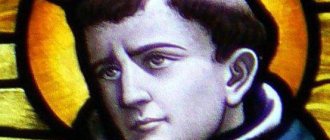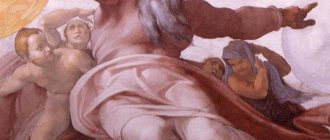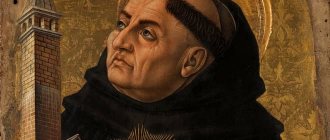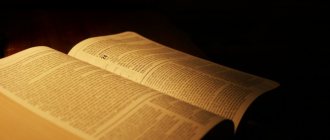Anselm of Canterbury (1033-1109) was a representative of realism and one of the founders of scholasticism, and was a prominent thinker of his time. In 1494 he was canonized. Mention of it is present in the “Divine Comedy” by D. Alighieri (section “Paradise”). Anselm of Canterbury's proof of God became widely known. In addition, he created three fundamental works in which he outlined his thoughts and theories.
Anselm of Canterbury: biography
The future great thinker was born at the B. Saint Bernard Pass. The father came from Lombardy, and the mother was a native of Aosta. She was related to the House of Savoy. Anselm (one of the mother's relatives) was a bishop. In 1032, after the death of King Rudolph the Third, Aosta became a vassal territory of Humbert the First of the White Hands. The family was not rich enough for the children to count on a substantial inheritance or any secure property position. As is known from sources, Anselm had a sister, Richesa. There is evidence that her husband subsequently participated in the Crusade. Even in his youth (at the age of 15), the future thinker Anselm of Canterbury decided to take monastic orders. However, the father was categorically against it. After a while, Anselm crossed the Alps and lived in Burgundy for several years. He didn't have any specific goal here. Rather, it was a “search for oneself.” He wandered from one monastery to another, studied at different church schools in France. In 1060, Anselm of Canterbury moved to Normandy. Here he stayed in one of the monasteries, where Lanfranc, famous at that time, became his prior. In the same 1060, Anselm entered the Benedictine order. After some time, he becomes prior, and in 1078 he is elected abbot.
God's mercy
He was born into a fairly wealthy family.
They did not live in poverty and did not experience hardships, such as hunger. But a nine-year-old boy had a dream that the Lord was talking to him and asking him to climb the highest mountain in those places, and then breaking bread with him. It was such a vivid impression that the child, who had never needed anything, remembered it for many years. Before the boy could enter the age of adolescence, his mother suddenly dies, leaving his father so inconsolable that, hardened with grief, he takes out his anger on his son. Unable to withstand such treatment, Anselm leaves home along with the old servant, who felt sorry for the boy. They cross the mountains on foot and end up in France. The travelers were so hungry that the guy started eating snow. In desperation, his fellow traveler looks into the knapsack, expecting to see emptiness, but instead finds a piece of white bread. Such a clear manifestation of God's mercy once again proves to the young man that he must devote himself to the church.
Bek Monastery
The first works were written here, thanks to which the world learned who Anselm of Canterbury was. The Middle Ages in general was rich in different thinkers. However, not all of them went down in history. It was in Bec that Anselm of Canterbury wrote his first works. They became Monologion and Proslogion. They not only brought him fame, but also a high reputation in Europe. The Bec monastery itself, largely due to the influence of Lanfranc, became one of the most influential religious communities of the Anglo-Norman monarchy, which had vast possessions in England. As abbot, Anselm visited Britain many times. Over time, he began to be seen as a completely natural successor to Lanfranc. Meanwhile, when he died in 1089, William II was in no hurry to fill the vacant post. The fact is that in the absence of the archbishop, all income from the lands belonged to the king. Only 4 years later, having become seriously ill and near death, Wilhelm, perhaps under the weight of his sins, agreed to Anselm’s election. The latter, in turn, tried to resign from his position. However, despite his protests, he was still elected archbishop.
The presence of God in every person
This church philosopher was haunted by the idea of how easy it was to prove the existence of God. Yes, so that everything is logical and understandable. This thought haunted the future bishop. Anselm of Canterbury briefly defined God this way - that beyond which nothing can be conceived. This statement will be understandable even to a person completely unfamiliar with religious teachings, which means that the understanding of God is present in each of us from birth. Therefore, God exists, since it is logically impossible to think that he does not exist. This hypothesis was too controversial and radical for that time, and not everyone was ready to accept it. Kant would later refute it in his Critique of Pure Reason.
Relations with authorities
Despite the fact that by the time of his appointment to the post of archbishop Anselm of Canterbury already had sufficient authority and was a well-known religious figure, in matters of public administration he lagged significantly behind his predecessor. He failed to establish cooperation between church and secular authorities. He failed to adequately protect the financial interests of religious organizations in England from William's encroachments. Anselm had a gentle character. But in matters of canon law and religion he took an uncompromising position. He did not want to make concessions to the government, which was experiencing a significant shortage of funds. The situation was aggravated by the fact that the king was the direct opposite of him. William II was cruel and cynical. He did not understand the means, seeking to strengthen his power.
Conflict with the King
Some time after Wilhelm's recovery, a dispute broke out between him and Anselm. The latter demanded the return of lands that had been taken away after the death of Lanfranc, a final decision in church affairs, as well as recognition of Urban II as pope. The king satisfied the first demand. But Wilhelm could not agree to the monarch’s refusal of the sole approval of the pope in England. The king himself and the public were inclined to recognize Clement the Third. But Anselm of Canterbury supported Urban while still an abbot and remained faithful to him. Over time, the dispute between the archbishop and the monarch only intensified. Moreover, new contradictions arose. In particular, the parties conflicted over the church’s contribution to the financing of William’s military campaigns, and over the morals that reigned at the court of the monarch, who had homosexual inclinations. Soon the relationship between the king and the archbishop was completely broken. At the same time, the English clergy sided with William. Moreover, the Bishop of Durham demanded Anselm's removal and expulsion from the country.
Recognition of Urban II
Wilhelm II, meanwhile, took a number of measures. First of all, he turned to Urban with a proposal to declare his recognition in England. However, at the same time, the king demanded that Anselm be deprived of the archbishop's rank. In May 1095, Walter of Albany, cardinal and papal legate, arrived in England. He, on behalf of Urban, granted the monarch an exceptional privilege. In accordance with it, without the consent of the king, not a single priest with legate powers could be sent to England. In response to this, William officially recognized Urban II as Pope. But having achieved his goal, the cardinal did not discuss the issue regarding Anselm’s removal, handing over the pallium (an element of vestment) to the archbishop. This situation did not help to reduce tensions between church and secular authorities. The monarch continued not only to ignore, but also to humiliate Anselm. The latter, in turn, did not receive the necessary support from the pope in the struggle for morality at court. In 1097, Anselm left the country without the consent of the monarch, heading to Rome. This meant that the income of the archbishopric was withdrawn for the benefit of the royal treasury.
Medieval philosophy
As we have already said, many of the problems that Augustine faced in his life were related to the solution of ethical issues, namely the origin of evil in the world. That is why Augustine at one time was a supporter of Manichaeism, that is why he became disillusioned with Manichaeism, was a skeptic, and it was the solution to this problem that St. Ambrose of Milan and Plotinus brought Augustine into the fold of the Christian Church.
The main problem of Augustinian ethics is the problem of evil. In addition to the problem of evil, Augustine was also concerned with the problem of freedom arising from the problem of evil, and the related problem of the relationship between human freedom and Divine grace: how to reconcile the free will of man with the Divine economy, with the fact that God creates everything and knows everything, through Him everything is happening. Despite all the influence of Plotinus, which Augustine himself speaks of, Augustine takes only one aspect of teaching from Plotinus: his doctrine of the metaphysical cause of good and evil.
For Plotinus, the reason for the origin of evil in the world is the absence of good. There is no evil as such in nature; evil is the deprivation of good. Evil, according to Plotinus, has no metaphysical nature, no metaphysical basis. This is precisely what Augustine saw as the main problem of Christianity, this is what led him to the Manichaeans in the beginning, and why he abandoned it. On the one hand, Augustine could not be satisfied with the position that God creates evil in the world, and on the other hand, in the Manichaean version, Augustine was not satisfied with the fact that there are two gods: one is good, the other is evil. This contradicts the very concept of God as an omnipotent being.
According to Augustine, the whole world was created from non-existence, and therefore only God is being, pure being, absolute, and the world was created from non-being and therefore contains this non-existence. Hence the possibility of evil. Hence there is physical evil, vice, evil that exists in bodies and in the material world in general: ugliness, imperfection of the material world, ugliness, defects in form, etc., and moral evil, understood as sin. The cause of physical evil, i.e. vice consists in the lack of perfection in bodies. The cause of moral evil is the imperfection of the human mind and will. Since the human mind and will are created imperfect, being created from nothingness, then the mind and will are perverted. The will deviates from being complete to being incomplete. In the Confessions, chapter 7, Augustine discusses this topic in more detail. I recommend that you read these chapters: from 3 to 16. Here Augustine highlights this problem once again in all its paradoxical nature and all its apparent intractability. Augustine writes that from the words of St. Ambrose of Milan he learned that evil is “from me,” that evil does not exist in the world, that God cannot be evil, that evil exists in the world because of free human will. But this answer did not entirely suit Augustine, because, as Augustine further writes, my will was also created by God. And if God created my will such that it can incline toward evil, then God provided for this evil in the world. He created my will as evil, imperfect, and therefore it doesn’t matter, God is guilty of this evil. What if the culprit is the devil, Satan? The very first angel who committed this sin, where does the evil come from? After all, he, too, was created by God, and by creating this angel, Dennitsa, God also put in him the possibility of sin, and therefore also put in him the possibility of evil? Therefore, no matter how much we try to justify God by blaming evil on any of His creations, we ultimately understand that everything was created by God, in the end we see that evil ascends to the Creator. This answer, naturally, does not suit Augustine and he tries to find another answer. God cannot be worse, this is an axiom understandable to every believer. God is complete perfection; He cannot deteriorate. Evil exists only where there is deterioration. Therefore, since God cannot deteriorate, then there is no evil in Him. But maybe, if there is no evil in the world, then, Augustine continues, there is the fear of evil itself - is it evil? Or perhaps the very matter of evil? - hinting at Plato's solution to this problem. But it cannot be that God, when creating matter, created it evil, being All-Good. Maybe then matter was eternal and had an evil nature? And Augustine also answers this answer in the negative, because even if matter were eternal, God still has the omnipotent power to change the evil nature of matter, turn it into good or destroy it. Moreover, we know that matter is not eternal, but is created by God. Therefore, these answer options do not suit Augustine either. From here he returns to the problem that he just posed, that evil is deterioration. But what could get worse? God cannot become worse, but something good, moral, existing in the world can become worse. Worse cannot be either something that does not exist, or God, everything else can be either better or worse. Everything that deteriorates is deprived of goodness, deprived to some extent of being. If a thing deteriorates completely, it ceases to be. Therefore, everything that exists is all good, and evil is non-existent, evil has no substance, otherwise if the substance of evil existed, it would be good. An example can be given here. Only what exists gets worse, and only good things exist; let’s say, only a living organism can get sick. If a person dies, then the disease also disappears; rotting can also only occur with an existing object. If an object rots and disappears, then the process of decay also stops. It’s the same with any other evil in the world. Evil exists only when there is an object that can bring evil, can worsen, i.e. there is goodness that can diminish. If goodness disappears completely, then the thing itself will disappear. Therefore there is no evil for God.
Evil, as Augustine writes, is considered to be that which, taken separately, does not agree with something. Augustine uses the well-known ancient principle of goodness as harmony, a principle dating back to Heraclitus, found in Plato and the Stoics. A person cannot cognize all the connections of the world, but for God everything exists in a universal connection, therefore everything is consistent with everything, therefore there is no evil, as such, in the world for God. The difference between evil and good is that if good really exists, good is being, then evil is a deterioration of good, i.e. that process that exists along with good. The same is true in relation to moral evil, sinfulness. Sinfulness is also not a substance. “Sinfulness is a perverted will, turning from God to the lower, throwing away its inner self and growing stronger in the external world,” writes Augustine. The human soul can also deteriorate while being good, and the deterioration of the soul consists in the fact that it turns away from the Creator and turns its gaze to creation, turns away from God and turns its gaze to the lower material world. The cause of moral evil, or sinfulness, is not only the fact that our soul is created imperfect, created from nothing. Our will was created free and therefore in our very will there is the possibility of the fall and rebirth. This possibility, of course, is not a necessity, God did not create our soul in such a way that it necessarily had to choose such an act, direct its will to disobey God, God only put into it the possibility. This possibility can become reality only with the participation of man, but God gives only the possibility of the Fall and the possibility of rebirth.
Let us remember the essence of the problem, since the problem of free will is generally the most difficult in philosophy, especially Christian, since here perhaps two incompatible theses collide: on the one hand, a person has free will and he can do whatever he wants, and on the other hand, another - everything in the world depends on God, like any human action. How to combine human free will with Divine predestination? This problem arose, of course, not in the times of Erasmus and Luther, but much earlier. This problem was first posed most acutely by the English monk Pelagius (the Greek form of his real name Morgan). In the 5th century, Pelagius came to Rome to preach and spent the bulk of his life there. This was a time when, with the adoption of Christianity as the official religion of the Roman Empire, people's attitudes towards Christianity also changed. If earlier people became Christians out of love for Christ and people went to martyrdom to profess their faith in the Savior, then in the 5th century people appeared who began to take advantage of the fact that Christianity was the official religion. People go to Church to receive material benefits and privileges, without sharing in their hearts faith in the Savior. There is a deterioration in morals among Christians, people begin to look for some semblance of Christian arguments that could justify their ungodly life, saying that everything is predetermined by God, like their immoral life, that man is sinful by nature and cannot count on anything what improvement in one’s morality, etc.
It was in this situation that Pelagius spoke, who exalted the importance of human freedom, saying that man himself is responsible for all his actions, including sinful ones. The heresy of Pelagius is quite strict; at first glance it is difficult to see where the error lies in it. Pelagius proceeds from the thesis that man is free, that the presence of free will is his main advantage and dignity; It is free will that distinguishes man from the entire animal world.
What is freedom? This is a Divine gift and a special moral force, capable of independently directing itself both in the direction of good and in the direction of evil. Since freedom directs itself towards good or evil, it itself must not be inherent in either good or evil. She is indifferent, indifferent to both. Freedom is a certain formal ability, a form of choice between good and evil. It has no moral content. Therefore, man himself, according to Pelagius, stands between good and evil. Freedom is not some kind of moral force, but only a certain ability to determine good or evil. Both remain indifferent to her. Therefore, the previous state also does not play any role for a person. A person leading a moral life is quite capable at a certain point in time of making a choice towards an immoral act, and vice versa - an immoral person can direct his free will to much better goals. And, of course, the actions of our ancestors can in no way affect our freedom. Freedom either exists or it doesn’t; free will even more so. This is not intelligence when one person is smarter and the other is dumber. Free will is such a thing that it either exists or it doesn’t.
All consequences follow from here. If I had not mentioned the name Pelagius, nothing here would probably have confused you. If we begin to consider original sin, then any person, according to Pelagius, Adam, Eve, and you and I are people, therefore we are free. And Adam had free will, and we have it. This will cannot be more or less, therefore we have the same free will. On the other hand, the actions of other people, including our ancestors, do not affect us. Therefore, the fall of Adam and Eve is their private sinful act; it does not affect us in any way. Man remains completely free even after the Fall. The only difference between us and Adam is that Adam did not have before his eyes an example of sinful actions, but we bear the stamp of the Fall - we know the sinful actions of other people, and this seems to seduce and confuse us. Therefore, only Adam is responsible for this sin, and God has no reason to punish all of humanity.
But why then did Adam live in paradise, and we live in a disastrous world? To this Pelagius replied that the evil that exists in the world is the normal order of things. It is wrong to think that Adam was created as an immortal, absolutely moral person, and we have lost the knowledge of the truth and the gift of immortality. Adam was just as mortal, he was the same as we are, and in his condition there could be illnesses, and suffering, and bodily desires, and passions, including sexual, otherwise, Pelagius said, where did the Divine commandment come from “ be fruitful and multiply"? After all, sexual passion is a certain driving mechanism that simply helps to realize this commandment. From this follows the fact that Jesus Christ, Who was also a man with all the passions inherent in him, has only this difference from us that He could manage and control these passions. Here also lies a huge problem, which would manifest itself with all its force later (in the 6th–7th centuries) in the heresy of monothelitism, in the dispute about whether there were two wills in Christ or one. If we do not agree with Pelagius and his assertion that Jesus Christ was a man and had all passions, then we will be forced to bow to the Monothelite thesis that in Him there was only one will - Divine, perfect. Here the Church had to withstand many tests and develop a theory that, on the one hand, would not fall into the trap of Pelagianism, which attributes vicious passions to Christ, and, on the other hand, would not fall into the heresy of monothelitism, which claims that Jesus Christ, although he had a human nature, He had one will. I talk about this in such detail that you will understand how the problem of free will permeates all Christian theology. Since a person is absolutely free, then a person also does not need grace as a special force directing to good deeds. Man has this power within himself and directs himself to good or evil deeds. A person can be saved without grace, everything depends on his own personal will. However, Pelagius could not deny the very fact of the presence of grace; he said that grace exists and God gave it to man in the form of the ability to do good, in the form of the very fact of the presence of free will. In freedom, Pelagius identified three elements: to be able, to desire and to do. A person can do something, wants to do it and does it. The possibility of doing something is grace, it is given to all people, and then it depends on the person whether he will choose this act and whether he will perform it. That is, grace lies in the presence of free will in a person, in the fact that a person can choose a good goal for his life. God's help to man consists only in helping man to know the truth and helping him choose the path to good. But this help is given only as a reward for virtue, so the basis of everything is still human free will. It turns out that no special Divine help in the form of grace is needed to save a person. There is no need for any connection between man and God, man himself arranges his own salvation, and God only distributes people depending on their actions: he gives some a reward for their good life, and sends others to eternal torment for their sins. This concept can well be called deistic: God creates the world, and then only observes it, without interfering in anything. Hence, the redemptive mission of Christ, the role of the Church and much more become incomprehensible.
Thus, based on the absolutely correct thesis that man has free will, Pelagius comes to an absolutely heretical conclusion about the uselessness of the Church and Divine grace. How to solve this problem?
One of the solutions was proposed by the blzh. Augustine. He argued that man was truly created good. He received free will, through which he could either maintain his heavenly perfection or lose it. However, unlike Pelagius, Augustine highlighted in freedom not only a formal element, that freedom is a certain indifferent ability to choose between good and evil, but also a qualitative element: freedom is a moral force that has an internal disposition to acquire some content. This force can be either good or evil. The newly created man had free good will. But if Adam and Eve had only good will, then where did the fact of the Fall come from? Augustine says that freedom is not only qualitative, but also formal. That is, in reality, Adam and Eve had good will, but they also had the opportunity to sin, and both of them realized this opportunity, turning it into reality. How to combine the fact of Adam committing a sinful act with Divine foresight and predestination? Augustine gives several answers to this question. Firstly, the very fact that a person has religious and moral consciousness indicates that a person is free and that providence exists. If a person believes in God, then he believes that providence exists. And if a person is moral, that is, he understands that he is responsible for his affairs, this means that he is free. Therefore, Augustine says that the existence of both predestination and freedom is an empirical fact. This needs to be researched, not proven.
Augustine argues that foresight does not deny freedom, but, on the contrary, can presuppose it. So, if a person foresees that there will be an eclipse of the sun, this does not mean that it is the person who arranges this eclipse. The order of events is such that a person foresees this event because it will take place regardless of him. Likewise, God foresees certain events because they will actually happen. However, God does not just foresee them - He wants them and arranges them. But it suits through final specific reasons. The free activity of a person is also some kind of activity for a reason, because this reason is in the person himself, there is his internal driving reason. Therefore, God predetermines all actions in the world, including human ones, taking into account all actions, including free ones. Another argument that Augustine gives, arguing that it is only for us that there is some kind of foreknowledge, predestination, because we live in time: for us there is “before”, “now” and “after”. With God, everything is “now,” so it cannot be said that He foresees or predetermines something; for Him everything is already accomplished. How does Augustine apply these principles to the solution of the problem of freedom and necessity and to the refutation of the heresy of Pelagius? Augustine argues that Adam and Eve had good will, but in its original state - the so-called lesser freedom. This freedom was good, but it still had the opportunity to sin. Adam and Eve, by their actions, had to direct themselves in such a way to serve the best, so that formally their freedom would be such that it could no longer sin. The Pelagians began to object to Augustine, saying that this could not be - freedom consists precisely in choosing between good and evil. To this Augustine replied that then God is not free, for He cannot sin. The Pelagians could no longer object to this. After the Fall, our soul changed so much that it became impossible for man to return to its original state on his own, only through grace, through the direct help of God. On the issue of the Fall and free will, Augustine argued for a long time with Pelagius, who believed that the Fall did not change the nature of man, and that after the Fall man remained as free and active as before. According to Augustine, the Fall changed human nature in such a way that further salvation is possible only with the help of God. After the Fall, the will became only the will to sin, and this is precisely the depravity of human nature. Man has become such that now he can no longer help but sin. This must be understood in the broadest sense: even if a person does good deeds, he still commits a sin - after all, there is always an element of vanity, or pride, or something else in him.
These provisions of Augustine raised many questions - whether a person is free or not, what he is predestined for: salvation or condemnation. Augustine did not deny either human freedom or the grace of God; he sought to find harmony between them. Here again the problem of the relationship between free will and predestination arises. Augustine writes in “On the City of God” that God, even at the creation of the world, predestined some people to salvation, and others to eternal torment. Doesn’t this principle of universal predestination contradict the position of human freedom, the fact that man himself creates his own evil? According to Augustine, this does not exclude freedom. First, Augustine distinguishes between freedom and free will. In his work “On the City of God,” Augustine argues on this topic with Cicero, the famous Greek philosopher, who also considered the problem of the relationship between predestination and freedom. Because, according to Cicero, if we admit that there is only predestination of everything and everyone, then this denies the need for a person to be moral. For why punish or reward a person if it can be said that this act is not a merit of the person’s free will, his morality, but is brought to life by some fatal circumstances or Divine intervention? Therefore, in this problem, in the opposition of freedom and grace, freedom and predestination, Cicero chooses freedom, denying the universal control of the world. Augustine says that this conclusion of Cicero does not suit him, because such a choice pays tribute to human freedom, but is sacrilege because it denies Divine providence in the world. Augustine says that God knows everything and predetermines everything, and we are free, and we can say that fate in the understanding in which the ancient Greeks thought of it, fate as fate, as an impersonal force that controls everything and everyone, there is no such fate at all , especially such a fate as the influence of stars. God's power is visible in everything, all causes ultimately ascend to God, and human will also ultimately ascends to God.
It turns out to be a kind of multi-stage system. God controls everything - some things and phenomena directly, such as the phenomena of the material world, and some phenomena indirectly, for example, through angels, and angels act on people or on the world. Or even more indirectly: through angels, and through people, and already people influence the world. In the end, it is the will that acts: the will of God, the will of the angels, the will of man. Therefore, we cannot say that freedom, i.e. the principle emanating from the active principle contradicts predestination. Predestination emanating from God is the principle of freedom, so there is no contradiction in this. A person acting according to the will of God is a being who realizes this principle, for freedom is given to man by God. Evil will, if a person has one, does not come from God, for it is contrary to nature. Free will is the essence of man, for it was given to man at the moment of his creation, therefore no one can cancel free will: neither God, nor man himself, this is his essence. And in solving the problem of the relationship between human free activity and Divine foresight, Augustine always insists that man always chooses himself. God foresees what a person will do, because foreseeing does not mean influencing or forcing. If God knows that I will do something, this does not mean that I do it with his direct intervention. However, we remember from another explanation in the Confessions that Augustine says that everything exists due to causes that ultimately go back to God. Therefore, we can say that this decision of Augustine is not entirely consistent; we will be forced to say that human freedom is illusory, that he has free will, but freedom of action is abolished by God. But this is not entirely true, because freedom, according to Augustine, is the opportunity for free will to choose the best.
In what case can a person choose the best? Only if he imagines all the choices that face him, i.e., the more knowledge a person has, the freer he is. God himself helps a person to become free, giving him his grace. Therefore, this interaction between the grace of God and the free activity of man is resolved in the following way: grace does not deny freedom, but, on the contrary, increases it. A person endowed with Divine grace has much greater choice in his action, therefore he has much greater freedom. And since freedom is the ability to choose the best, a person under grace is freer, because he always chooses the best. Without grace, a person is unfree, tied to the flesh, becomes a slave of sin, therefore a person who knows God and receives grace from Him truly becomes free. Therefore, after the Last Judgment, after the general resurrection, there will be more freedom than we have now, because then there will be no sinful will, there will be no sinful knowledge, there will be no opportunity to sin.
Augustine’s problem of freedom is also connected with the problem of love, Divine love for man, which gives him grace, and man’s love for God and for other creatures, and in general love as the principle that organizes the world. Augustine explains love in Aristotelian terms - as a desire for a natural place. According to Augustine, the whole world has a hierarchical structure, everything in the world has its natural place. In the inanimate world, the natural manifestation of this love is the heaviness of a thing, for fire the manifestation of love will be the desire to rise up, for oil that is poured on water, the manifestation of love will be to float to the surface of the water, etc. Love is the principle that organizes the whole world. The soul's natural place is in God, so the soul is drawn to God. The soul must love God, this is the soul’s desire for God, this is the manifestation of its love for God. If the soul strives for God, then the body is drawn to the corporeal. This is where physical love and spiritual love arise. They can contradict each other, and if a person increases his physical love, then his spiritual love decreases, and vice versa, with an increase in love for God, his love for the physical decreases.
Spiritual love, based on free will, is free, in contrast to physical love, which is not free and is subject to the laws of the physical world. A person can love his love or, conversely, hate it, and this is precisely what human morality consists of. A moral person is one who loves his love for God and hates his love for the bodily, and vice versa, a vicious person is one who does not love his love for God and loves his love for the bodily, for pleasures. This is the difference between the Augustinian and the Christian concept of will in general from the ancient concept. In antiquity there was no such thing as loving or hating one's own love. Only deeds were subject to moral evaluation. Virtue in antiquity is conformity to one’s nature. A virtuous horse is one that runs fast, a virtuous person is one who thinks correctly, etc. A virtuous person loves only what is worthy of love, for throughout the world there is an order of love. This order was established by God, therefore the order of love, or more precisely, as Augustine writes, “order in love,” is human virtue. The internal correlate of this order of love, the assessment of whether a person loves correctly or incorrectly his own desires, his own love, is conscience. Every person has a conscience, even those who do not have a correct idea of the order of love, and it is this principle that is implanted in man by God, so that with the help of conscience a person can better evaluate his own order in love. If a person achieves this order in love, reaches a natural place, then such a person achieves bliss, happiness. Therefore, according to Augustine, happiness is the acquisition of a natural place. “No one can be happy unless he has what he desires or desires what is evil,” writes Augustine in On the Trinity. You cannot desire what is evil, otherwise it will lead a person to misfortune. You can only enjoy the unconditional good, the fruit of the love of a person worthy of God; everything else can only be used.
Augustine develops a theory of the interaction of two concepts - pleasure and use. “To enjoy” in Latin is frui, “to use” is uti, in all textbooks, as a rule, this opposition is given: uti - frui, to use - to enjoy. If a person enjoys what should be used, then this leads to suffering; if a person uses what should be enjoyed, this also leads to suffering, so one must enjoy what is worthy of enjoyment and use what needs to be used. There is also an order to this. And human depravity, or sin, consists of this - in the change of places of pleasure and use: uti and frui. Man enjoys what is to be used and enjoys what is to be enjoyed. To enjoy is to love something for its own sake. To use means to love it for the sake of something else. There is only one being worthy of pleasure and love for its own sake - this is God, everything else except God should be used. But since everything in the world was created by God, then everything in the world must be loved, because there is an order of love in the world. We must strictly understand this order; we must love all goods, but not for their own sake. In the things themselves we must love their beauty, their truth, their goodness, i.e. what is given to these things from God, to love things for their own sake, is the principle of human sinfulness.
In addition, Augustine points out, one must love one’s own body and take care of one’s own health, but not attach self-sufficient importance to this, i.e. We must love our body not for the sake of our own body, but for the sake of the Creator, who created this body and gave it to us, and take care of our health. Because health is a gift that helps us act in the world, love our neighbors, help our neighbors, not be selfish and divert all the forces of society to ourselves. It’s another matter when a person turns his concern for his body, his health into a primary value, and indulges in either gluttony or selfish desire for his own health. The body is the temple of the soul, and we need the body to glorify God in it, and not to glorify our own body.
From this principle of pleasure and use follows the hierarchy of love, because one must love what is closer to God. The soul is closer to God, so the soul must be loved. A living body is closer to God than inanimate matter, therefore the body must be loved more than inanimate, but God must be loved more, as the only thing that can be enjoyed and not used.
Stay in Rome
The Pope accepted Anselm as an equal. For some time he settled in Telese in the monastery of San Salvatore. Here he completed his fundamental work, Cur Deus Homo. In October 1098, Anselm of Canterbury took part in a church council held in Bari, and a year later in Rome. They approved decrees against secular investiture (the introduction of vassals into the possession of fiefs), simony (the purchase and sale of religious positions, dignities, sacred rites and sacraments), as well as marriages of church ministers. Despite the respect that was shown to Anselm by the highest clergy of Italy, he was unable to gain the support of the pope in the conflict with the English monarch. Urban refused to excommunicate the king. Anselm went to Lyon. There he remained with Archbishop Hugo (his friend) until the death of William II.
Priest
Lanfranc is transferred to another monastery, and Anselm of Canterbury becomes the new priest. During this period, he formed ideas that were later reflected in books on theology. Philosophical questions regarding the reason for the Savior’s sacrifice, an instrument for understanding the world, occupy his thoughts. The interpretation of these controversial maxims, both from the point of view of philosophy and from the point of view of theology, brings public recognition to the preacher of Canterbury.
The fight against secular investiture
In 1100, Henry I ascended the throne of England. The new king invited Anselm to return to his archbishop's post. On September 23, the clergyman arrived in England. By that time, Anselm was in favor of the Cluny reform, so the archbishop refused to accept secular investiture on church lands. A new conflict broke out. Henry I, recognizing the talents of the clergyman and even having deep respect for him, did not want to give up the established right of kings. It was not possible to reach a compromise due to the position taken by Pope Paschal II. He was categorically against any government interference in the process of appointing bishops. Anselm went to Rome in 1101 to speak personally with the pope. But, having failed, he decided not to return to England and again remained in Lyon.
Reaching an agreement
In 1105 the situation became more complicated. Bishops who received investiture from Henry were excommunicated by the pope. Anselm threatened the king himself with the same outcome. In this situation, Henry was forced to come to an agreement. In 1105, on July 22, the archbishop and the king met at Laigle. Henry agreed to return all income from the lands in exchange for recognition of the bishops who received investiture. Despite the fact that the pope opposed this outcome, negotiations continued. Adela of Normandy, the king’s sister, played a special role in the reconciliation of the parties. She was close to one of the most authoritative religious figures in Europe - Ivo of Chartres. He advocated allowing the authorities to participate in the process of appointing bishops. In 1107 an agreement was finally reached. Later it formed the basis of the Concordat of Worms, which ended the struggle for investiture in Germany.
Last years
After settling the investiture issue, Anselm returned to England. This happened in 1107. There he confirmed the bishops chosen by the monarch. Anselm spent the remaining 2 years in Canterbury. Here he dealt with current church affairs. In 1109, on April 21, Anselm died. In 1494, Pope Alexander VI canonized the archbishop. In 1720, Clement XI proclaimed him a Doctor of the Church.
Anselm of Canterbury: main ideas
The Archbishop believed that faith is the basis of rational knowledge. Anselm of Canterbury's ontological proof of the existence of God became widely known. He derived his arguments from the very concept of the Almighty. His theory consisted of the following provisions:
- Everything strives for the Good. But God is the Absolute Good himself.
- Everything has a limit - an upper limit. This is God himself.
- For some reason, being is whole. This is God himself.
- God as perfection.
The Almighty surpasses everything imaginable in magnitude. This means that he exists outside the world and outside man. Anselm of Canterbury's motto is “I believe in order to understand.”
Cognition: faith or higher reason?
According to surviving documents, Anselm of Canterbury, whose ideas were so actively and enthusiastically accepted by the church, believed that for knowledge it is necessary to believe, because if the world was born from the idea of someone great, then only faith can help understand his plan. This statement, somewhat controversial at first glance, immediately gained supporters who were able to convince everyone else of its truth. In addition, from this maxim it was possible to derive another, that the concept of God is born simultaneously with man and already exists in him - therefore, God also exists.
Theory of the Atonement
Anselm of Canterbury is considered to be the first thinker to present the content of Christian teaching in legal terms. The archbishop's philosophy is outlined in the treatise Cur Deus homo. The work provides the following arguments:
- Original sin is an attack on the Divine world order. Therefore, this is a crime against God.
- Since the Almighty is infinitely great, his offense should be considered infinitely great.
- There was a need for satisfaction for sin, which even all people who are limited and sinful cannot bring.
- Only God, as an infinite Being, can pay by sending his Son to suffer on the cross, for which he becomes human.
This theory aroused the interest of many Russian church leaders in connection with disputes about the conformity of the provision of Atonement with Orthodoxy, widespread in the Synodal period. Meanwhile, the teaching that prevailed at that time was not limited solely to the concept proposed by Anselm of Canterbury. The philosophy of the Synodal period also included the theory of healing from sin by grace. Some church leaders believed that “juridism” does not reflect the essence of the Redemption, but expresses only feudal customs of satisfaction, which, in turn, have a pagan basis.
Proofs of the existence of God
- Good and Good exist both in the context of the acts of God and independently of him in various spheres of existence, as Anselm of Canterbury argued. His main ideas boiled down to reflections on the many-sided essence of God. In this case, this is the essence of Good.
- Every thing has its reason. What is our world if not the sum of things? The world is also a thing in some way, and must also have a cause. So, the power that can create such an amazing “thing” is God.
- Each item has its own degree of perfection, which can be compared with others. And if there is comparative perfection, then there is incomparable perfection. This will be God.
- This idea repeats the mental theory of the existence of God. Since even in the clouded brain of a mentally ill person there is the thought of a being beyond whom nothing can be conceived, then this is God.
These four proofs were derived by Anselm of Canterbury (the biography was briefly summarized in this article). While still in France, similar ideas began to come to him. They crystallized, reasonable and logical explanations were found, and built into a harmonious formula for the existence of God.
You can read more about this evidence in the treatise called “Proslogium,” which is entirely devoted to ideas about the peculiarities of human thinking, the influence of faith on this process and the intervention of God.










